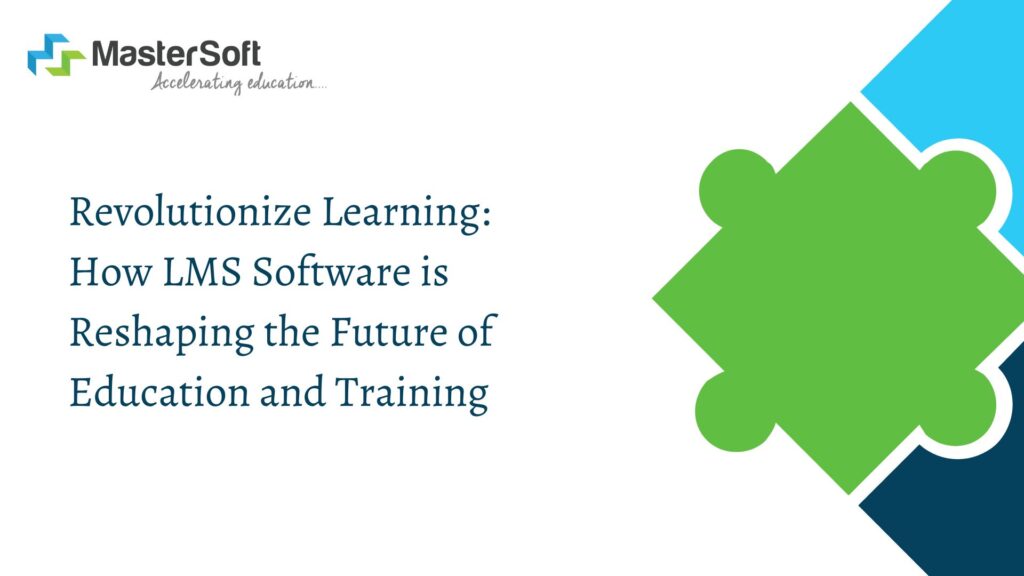In the ever-evolving landscape of education and training, Learning Management Systems (LMS) have emerged as a transformative force, revolutionizing the way we acquire knowledge and skills. As technology continues to advance, traditional methods of learning are giving way to more dynamic and adaptive approaches, and LMS software stands at the forefront of this educational revolution. This blog will explore the various ways in which LMS software is reshaping the future of education and training, providing a comprehensive overview of its impact on learners, educators, and organizations.
- Accessibility and Flexibility
One of the key contributions of LMS software to the education sector is the enhanced accessibility and flexibility it offers. Traditional classrooms are no longer the sole avenues for learning; instead, LMS platforms enable learners to access educational content anytime, anywhere. This flexibility is particularly valuable for working professionals, allowing them to pursue further education and training without compromising their work commitments. The 24/7 accessibility of learning materials ensures that individuals can learn at their own pace, fostering a more inclusive and personalized learning experience.
- Personalized Learning Paths
LMS software facilitates personalized learning paths tailored to individual needs and learning styles. Through advanced analytics and tracking features, these platforms gather data on learner progress, preferences, and performance. Utilizing this data, educators can customize learning modules, ensuring that each student receives targeted content that aligns with their strengths and addresses their weaknesses. This adaptive learning approach not only enhances engagement but also significantly improves retention rates, as learners receive content at a pace and in a format that resonates with them.
- Collaboration and Communication
LMS platforms are breaking down geographical barriers by fostering collaboration and communication among learners and educators across the globe. Discussion forums, live chat features, and collaborative projects enable students to engage in meaningful interactions with their peers and instructors, creating a virtual learning community. This collaborative environment enhances the overall learning experience, promoting knowledge sharing, teamwork, and the development of essential interpersonal skills.
- Gamification for Engagement
To combat the monotony often associated with traditional learning methods, many LMS software solutions incorporate gamification elements. By integrating game-like features such as badges, points, and leaderboards, these platforms transform the learning process into an interactive and engaging experience. Gamification not only captures the attention of learners but also motivates them to actively participate and progress through the curriculum. This innovative approach enhances the overall learning experience, making it more enjoyable and effective.
- Real-Time Monitoring and Assessment
learning management system software empowers educators with real-time monitoring and assessment tools, enabling them to track learner progress instantaneously. Through quizzes, assignments, and assessments integrated into the platform, instructors can gauge the effectiveness of their teaching methods and adjust the curriculum accordingly. Additionally, instant feedback mechanisms provide learners with timely insights into their performance, allowing for continuous improvement. This real-time monitoring not only enhances the efficiency of the educational process but also ensures that learners are better equipped for success.
- Cost-Efficiency and Resource Optimization
The adoption of LMS software brings about significant cost efficiencies for educational institutions and organizations. Traditional learning materials, such as textbooks and printed resources, incur substantial expenses. LMS platforms reduce these costs by providing a centralized, digital repository for educational content. Furthermore, the scalability of LMS allows institutions to accommodate a larger number of learners without incurring proportional increases in infrastructure and administrative costs. This cost-effectiveness makes quality education more accessible to a broader audience.
- Professional Development and Training
Beyond traditional academic settings, LMS software is revolutionizing professional development and corporate training programs. Organizations are increasingly turning to LMS platforms to streamline employee training, onboarding processes, and skill development initiatives. The ability to deliver consistent training materials to a dispersed workforce, coupled with tracking features to monitor employee progress, enhances the efficiency and effectiveness of training programs. This adaptability positions LMS as a cornerstone for fostering a culture of continuous learning within organizations.
- Integration with Emerging Technologies
The evolving landscape of education is intertwined with emerging technologies, and LMS software is no exception. Integration with artificial intelligence (AI), virtual reality (VR), and augmented reality (AR) is expanding the capabilities of LMS platforms. AI-driven analytics offer deeper insights into learner behavior, allowing for more refined personalization. VR and AR simulations provide immersive learning experiences, particularly beneficial for fields that require hands-on training. The synergy between LMS and emerging technologies is propelling education into new frontiers of innovation.
Conclusion
Learning Management Systems are reshaping the future of education and training by offering unprecedented accessibility, personalization, and collaboration. The transformative impact of LMS software extends beyond traditional classrooms, reaching professional development and corporate training. As technology continues to advance, the integration of emerging technologies further propels the capabilities of LMS platforms. The revolution in learning catalyzed by LMS software signifies a paradigm shift towards a more inclusive, flexible, and effective educational landscape, ultimately preparing learners for success in the rapidly changing world.


